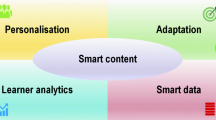Abstract
In this paper, we describe an architectural framework for the engineering of distributed learning environments with different devices and multi-language agent support. The framework consists of a central Tuple Space server and clients that differ in hardware (PDAs, PCs with projection) and in programming languages (C#, Prolog, Java). The analysis components use state patterns and action patterns to be defined in and interpreted by Prolog. This framework has been used for supporting the design rationale method QOC in a collaborative visual modelling environment.
Preview
Unable to display preview. Download preview PDF.
Similar content being viewed by others
References
Chan, T., Roschelle, J., Hsi, S., Kinshuk, M.S., Brown, T., Patton, C., Cherniavsky, J., Pea, R., Norris, C., Soloway, E., Balacheff, N., Scardamalia, M., Dillenbourg, P., Looi, C., Milrad, M., Hoppe, U.: One-to-one technology-enhanced learning: An opportunity for global research collaboration. Research and Practice in Technology Enhanced Learning 1(1), 3–29 (2006)
Liu, C., Kao, L.L.: Handheld devices with large shared display groupware: tools to facilitate group communication in one-to-one collaborative learning activities. In: Proceedings of IEEE WMTE 2005, Tokushima, Japan, March 2005, pp. 128–135 (2005)
Bollen, L., Juarez, G., Westermann, M., Hoppe, H.U.: PDAs as input devices in brainstorming and creative discussions. In: Proceedings of 4th International Workshop on Wireless, Mobile and Ubiquitous Technologies in Education (WMUTE 2006), pp. 137–141. IEEE Computer Society Press, Los Alamitos (2006)
Gassner, K., Jansen, M., Harrer, A., Herrmann, K., Hoppe, H.U.: Analysis methods for collaborative models and activities. In: Proceedings of CSCL 2003, Bergen, Norway, June 2003, pp. 369–377 (2003)
Gelernter, D.: Generative communication in Linda. ACM Transactions on Programming Languages and Systems 7(1), 80–112 (1985)
Lehman, T.J., McLaughry, S.W., Wycko, P.: T Spaces: The Next Wave. In: Proceedings of the 32nd Hawaiian International Conference on Computer Systems 1999, HICCS, Maui, Hawaii (1999)
Brecht, J., DiGiano, C., Patton, C., Tatar, D., Chaudhury, S.R., Roschelle, J., Davis, K.: Coordinating networked learning activities with a general-purpose interface. In: Proceedings of the 5th World Conference on Mobile Learning, Banff, Canada (October 2006)
Garrido, J.L., Noguera, M., Gonzalez, M., Gea, M., Hurtado, M.V.: Leveraging the Linda coordination model for a groupware architecture implementation. In: Dimitriadis, Y.A., Zigurs, I., Gómez-Sánchez, E. (eds.) CRIWG 2006. LNCS, vol. 4154, pp. 286–301. Springer, Heidelberg (2006)
Giemza, A., Weinbrenner, S., Engler, J., Hoppe, H.U.: Tuple spaces as flexible integration platform for distributed learning environments. In: Proceedings of ICCE 2007, Hiroshima, Japan, November 2007, pp. 313–320 (2007)
Regli, W.C., Hu, X., Atwood, M., Sun, W.: A survey of design rationale systems: Approaches representation, capture and retrieval. Engineering with Computers 16, 209–235 (2000)
MacLean, A., Young, R., Belloti, V., Moran, T.: Questions, options, and criteria: Elements of design space analysis. Human-Computer Interaction 6(3/4), 201–250 (1991)
Hoppe, H.U., Gaßner, K.: Integrating collaborative concept mapping tools with group memory and retrieval functions. In: Proceedings of CSCL 2002, Boulder, USA, January 2002, pp. 716–725 (2002)
Davis, F.D.: Perceived Usefulness, Perceived Ease of Use, and User Acceptance of Information Technology. MIS Quarterly 13(3), 319–340 (1989)
Author information
Authors and Affiliations
Editor information
Rights and permissions
Copyright information
© 2008 Springer-Verlag Berlin Heidelberg
About this paper
Cite this paper
Bollen, L., Giemza, A., Hoppe, H.U. (2008). Flexible Analysis of User Actions in Heterogeneous Distributed Learning Environments. In: Dillenbourg, P., Specht, M. (eds) Times of Convergence. Technologies Across Learning Contexts. EC-TEL 2008. Lecture Notes in Computer Science, vol 5192. Springer, Berlin, Heidelberg. https://doi.org/10.1007/978-3-540-87605-2_8
Download citation
DOI: https://doi.org/10.1007/978-3-540-87605-2_8
Publisher Name: Springer, Berlin, Heidelberg
Print ISBN: 978-3-540-87604-5
Online ISBN: 978-3-540-87605-2
eBook Packages: Computer ScienceComputer Science (R0)




